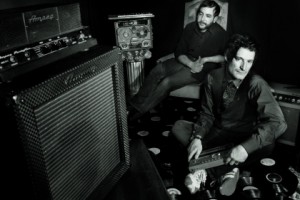 Cut to Chase Chorus and Fade (CTCCAF), the recent album from Seattle downtempo, hip hop and rock fusion combo, The Animals at Night (TAAN), has the smooth enchantment of a Chopin nocturne, the bracing tonic effervescence of a Charlie Parker solo, and the stark darkness of a Philip Glass mix tape. All those sounds are comfort in the blackness of night, and CCTCAF is definitely a point of light amid gathering post-modern hipster darkness. Longtime Seattle songwriter and studio soundcrafter Graig Markel plays guitar and sings. Josh Umami plays synths and bass. Joe Patterson provides drum and percussion. Markel and Umami share production credits.
Cut to Chase Chorus and Fade (CTCCAF), the recent album from Seattle downtempo, hip hop and rock fusion combo, The Animals at Night (TAAN), has the smooth enchantment of a Chopin nocturne, the bracing tonic effervescence of a Charlie Parker solo, and the stark darkness of a Philip Glass mix tape. All those sounds are comfort in the blackness of night, and CCTCAF is definitely a point of light amid gathering post-modern hipster darkness. Longtime Seattle songwriter and studio soundcrafter Graig Markel plays guitar and sings. Josh Umami plays synths and bass. Joe Patterson provides drum and percussion. Markel and Umami share production credits.
“The Emperor’s Dirty Clothes” kicks off the work with the sounds of the cold prairie winds of Markel’s Nebraska childhood and slips into echoing darkness and lost light which no ‘Husker should have to endure. “Just wear your dirty clothes,” Markel later sings in ominous resignation, establishing in the first tune the downer vibe of diminishing lux which will cloak the entire work.
Track two, “Great Escape” has a playful wickedness. Terri Moeller adds a seductive guest vocal and the wee hours suddenly don’t seem so empty. “Sometimes I just crave the warm embrace of status quo,” Moeller coos, her whispered vocals through pursed crimson lips popping hot and vivid in your ear. “But this isn’t one of those days,” she continues, and the moment’s ear lobe fantasy is lost, like bourbon, off-brand cigs and resolutions for a better life, in the progression of the song and the evening. In a Bukowskian perfect world, this megahit would top the charts.
“Once When I Was King” talks about the coming of twilight. Twilight has been the subject of Graig Markel songs at least since “Twilight Exit” in the 90s, a song title so good a Seattle bar was named after it. “We slowly drift away,” Markel sings in “Once When I Was King,” and so we do. We, the listeners, drift into the smooth hypnotic soundscapes of CCTAF and we’re taken for a ride, and that ride makes us glad.
Very glad.
Glad despite the darkness in our lives.
Glad because those shifting downtempo beats understand the darkness in our lives and still accept us.
In “Tiger Stripes,” a chiming, crystalline, arpeggiated piano run is contrasted with some murky bass synths as if to illustrate the duality hidden in every human breast as the song’s protagonist looks inward and is not happy with what he sees.
“Dead Session” is a near instrumental—digital scats only–which streaks through booty dropping dance clubs and never goes home hungry. Sex is in the air, on the walls, in the beats, in your lizard brain, everywhere.
“The Bull is Back In” suggests some old school, Soul Train soul with puckish, horny synths, bouncy, ass-grabbing bass, and the party time advice everyone loves to hear: “Do what you wanna do, say what you gotta say, shake up your rainy days…”
“Dust to Burn” adds some sotto voce vocals to meat and potatoes modernity to remind us that from dust we have come and back to dust we will return. “We don’t move…” is the mantra of quietus upon which the song ends.
“Nobody Moves, Nobody Gets Hurt” chronicles the armed robbery of whatever selfish hopes still wander your vain soul. “You will not settle for love,” Markel sings, “now come on…”
On “Dyin Slow on Sunday Morning,” TAAN expresses all their anger and disappointment in coolish clicks and fervid electro nihilistic blips which worm their way into your frontal lobe and work like spyware to dismantle all of your aesthetic insecurities and spread the good news to the waiting world via your ever-confident countenance.
“We are the Lights on the Way Out” is what Graig Markel does best, a benighted but hopeful song on which to end an album, a song which simultaneously leaves listeners tantalized and overcome with the irrepressible desire to push “Replay.” We, humanity, are indeed the lights on the way out of this dark world, and that fact must always be remembered.
The entire work weaves into a perfect mood piece. Song slips into song, beat into beat, until, before you give it another thought, a great piece of music has just passed you by. The Animals at Night describe themselves as melding the R&B of Eddie Floyd, the soul of Gil Scott Heron, the synths of Michael Andrews and the rock guitar of Sonic Youth. That’s a fair assessment, but the truth is more complicated, more subtle and more lovely than that. Suffice to say that Cut to Chase Chorus and Fade is a delicate, beautiful gift of personal and powerful art from Markel, Umama and Donovan to everyone who has ever been lonely in the night and leave it at that.
For more information – http://theanimalsatnight.com
.
.
.


